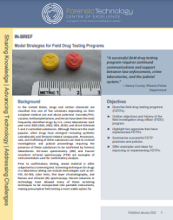Drug testing
Comparing two seized drug workflows for the analysis of synthetic cannabinoids, cathinones, and opioids
Development and evaluation of a synthetic opioid targeted gas chromatography mass spectrometry (GC-MS) method
A framework for the development of targeted gas chromatography mass spectrometry (GC-MS) methods: Synthetic cannabinoids
Cannabinoid-based vaping products and supplement formulations reported by consumers to precipitate adverse effects
Model Strategies for Field Drug Testing Programs
Gas Chromatography-Mass Spectrometry Paired with Total Vaporization Solid-Phase Microextraction as a Forensic Tool
Assessing Hair Decontamination Protocols for Diazepam, Heroin, Cocaine and Delta(9)-Tetrahydrocannabinol by Statistical Design of Experiments
The problems with Cannabinoid Analogs (Delta-8 THC, Delta-10 THC and CBD) and their metabolites detectability in urine drug testing for potential cannabinoid abuse.
Detection and characterization of the new synthetic cannabinoid APP-BINACA in forensic casework
Evaluation of Synthetic Cannabinoid Metabolites in Human Blood in the Absence of Parent Compounds: A Stability Assessment
FIELDABLE MASS SPECTROMETRY FOR FORENSIC SCIENCE, HOMELAND SECURITY, AND DEFENSE APPLICATIONS
The influence of chemical modifications on the fragmentation behavior of fentanyl and fentanyl-related compounds in electrospray ionization tandem mass spectrometry
The characterization of isobaric product ions of fentanyl using multi-stage mass spectrometry, high-resolution mass spectrometry and isotopic labeling
NIJ Recidivism Forecasting Challenge Webinar Transcript
Challenge has closed
Thank you to everyone who submitted an entry. Winners will be notified by August 16, 2021, and posted online.
Winners are to submit paper outlining the variables that were tested, indicating which were of statistical significance and which were not, by September 17, 2021.
DARYL FOX: Good afternoon, everyone. Welcome to today's webinar. NIJ's Recidivism Forecasting Challenge, hosted...
Fast and Portable Drug Testing: Dual-Method Prototype Shows Promise for Court-Admissible Drug Testing
Novel Synthetic Opioids in Oral Fluid: Analytical Methods and Prevalence
Research on Forensic Toxicological Laboratory Testing and Reporting Practices
Research on Forensic Toxicological Laboratory Testing and Reporting Practices
Expanding Research to Examine the Impacts of Forensic Science on the Criminal Justice System
In 2004, the National Institute of Justice created the social science research on forensic sciences (SSRFS) research program to explore the impact of forensic sciences on the criminal justice system and the administration of justice. Much of the early research from the SSRFS program focused on DNA processing and the use of DNA in investigations and prosecutions.
See the YouTube Terms of Service and Google Privacy Policy




